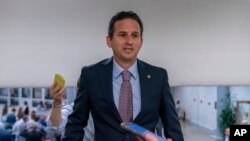Student Union
- By Doug Bernard
US Shutdown: An International Perspective
Today's post comes to us from Jialing Huang, a second-year graducate in communications studies at the University of China. This is her second year studying in the United States, traveling here from her home in China. For those unfamiliar, the U.S. government is presently partially shutdown due to major policy disagreements between Republicans and Democrats.
But this time I did some research on it. I began to really understand why they had to shut the government down-it is because the congress cannot make an agreement on the billing plans. Even though taking so long for the congress to make an agreement is frustrating, I admired the fact that they allowed different voices to rise, and will not make any decision until they reach an agreement, which can avoid unwise fiscal decisions that waste people’s money. I also tried to compare the way they make decisions with that of Chinese government. As we all know, the communist party is dominating the government, and that allows it to always make decision quickly. However, we did not have the chance to know or question how people’s money has spent just until recently. In fact, according to Xinhua News agency, not until 2009 did the Chinese government started to make the fiscal plan public. But still, how the local government spent the money remain unknown.
However, one of my friends, Kai Zang, who is studying legal education in United States, was disagree with me. He believed that the different voice of the congress was still the voice of each party and thus was for the interest of their own. He also thought that low efficiency was becoming a large problem of the U.S government. As he said, “When they are trying to spend money wisely, they are paying a lot for its low efficiency. “
But as an international student, Kai admitted that the shutting down would not have much influence on him. In fact, many of my friends show an indifferent attitude towards the news. As my friend Yiwei said, “The only consequence that may influence me, an international student, is that I cannot go to the Everglades in the near future (A national park in Florida). I think I am fine with that.”
See all News Updates of the Day
Universities in Middle East building research relationships with China

As China bolsters research relationships with universities in the Middle East, the United States has taken notice – especially when that research involves artificial intelligence.
Reporting for University World News, Yojana Sharma has the story. (March 2024)
Tips for staying safe while studying in the US

Recent news events have raised safety concerns among some international students studying in the United States.
Adarsh Khandelwal, writing in the India Times, has tips for staying safe from the moment you arrive until the day you complete your studies. (March 2024)
Some colleges are making digital literacy classes mandatory

A 2019 study by Stanford found that most college students can’t tell the difference between real and fake news articles. Amid rampant online disinformation, and the threat of AI-generated images, some schools are making students learn “digital literacy” to graduate.
Lauren Coffeey reports for Inside Higher Ed. (March 2024)
With federal student aid delays, students aren’t sure what college will cost

The U.S. Department of Education’s federal student aid form (FAFSA) experienced serious glitches and delays this year.
Now, many students have been admitted to college, but don’t know how much money they’ll need to attend.
Read the story from Susan Svrluga and Danielle Douglas-Gabriel for The Washington Post. (March 2024)
Senator draws attention to universities that haven’t returned remains

More than 70 U.S. universities continue to hold human remains taken from Native American burial sites, although those remains were supposed to be returned 30 years ago.
Jennifer Bendery writes in Huffington Post that one senator has been using his position in an attempt to shame universities into returning remains and artifacts. (April 2024)







